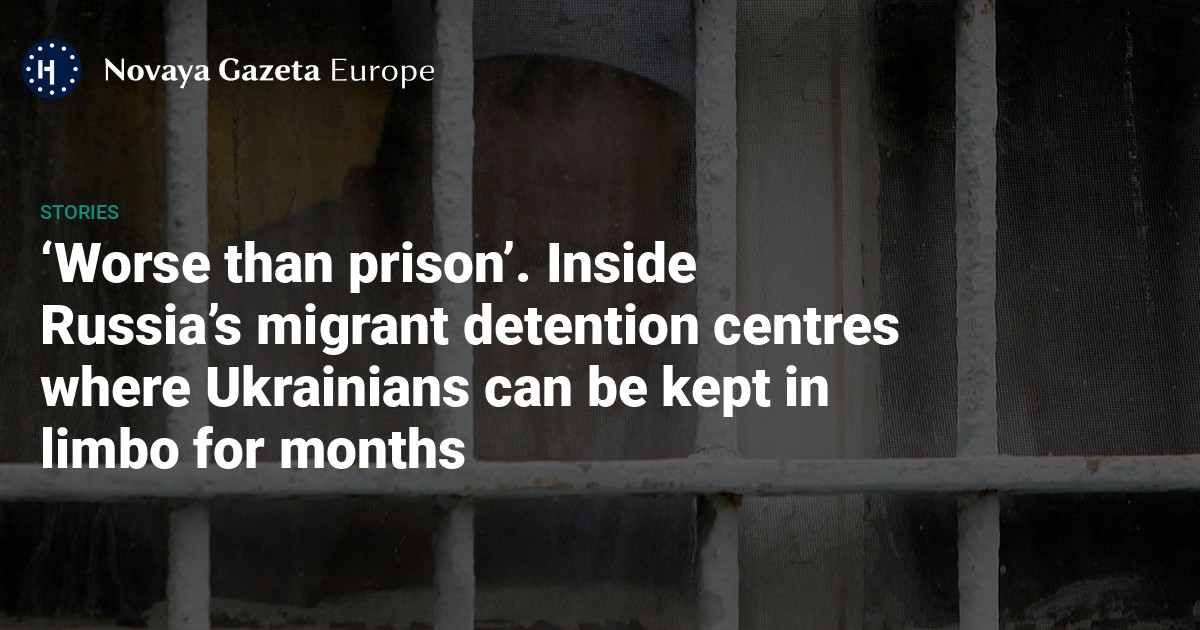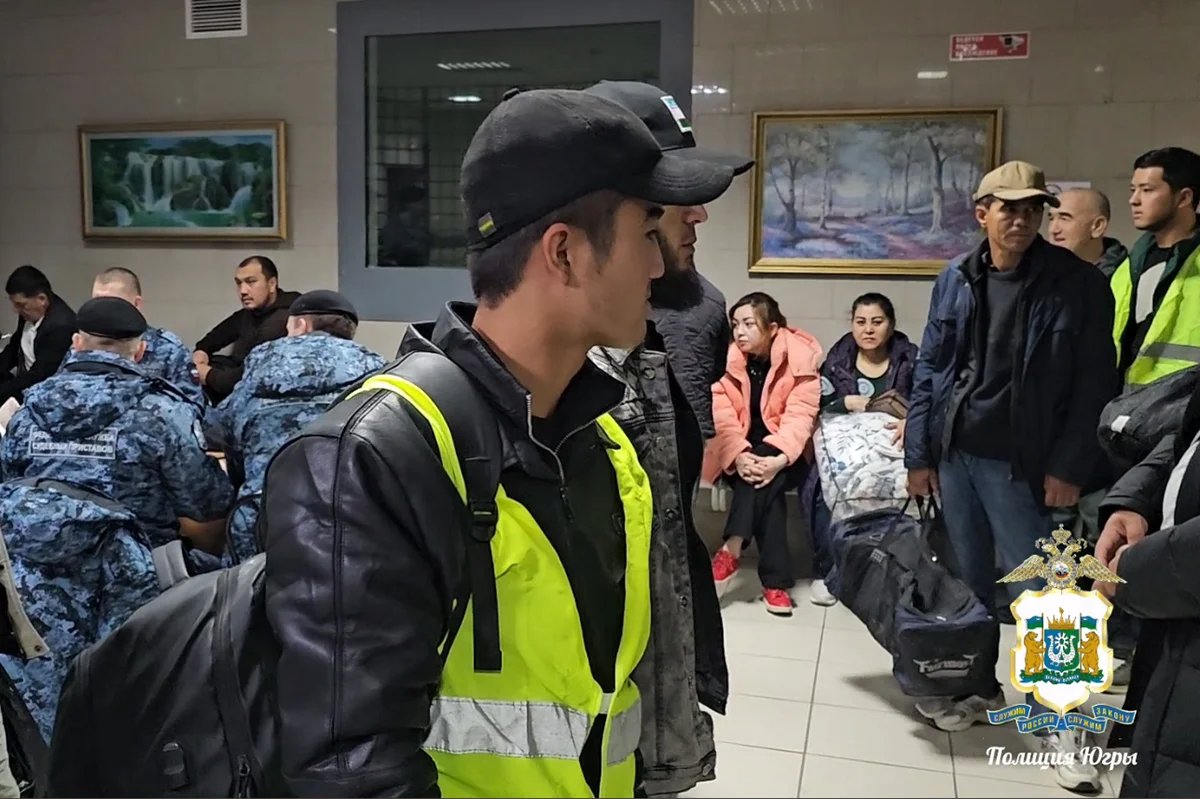


In a converted warehouse on the outskirts of the village of Voronino, in Russia’s western Smolensk region, nearly 90 Ukrainian citizens have been held for several months, despite being transferred from prisons and other detention centres with the promise of imminent repatriation to Ukraine as part of a prisoner exchange.
Among them are former prisoners, people with no criminal record, and those who are seriously ill, including individuals with HIV, AIDS, and tuberculosis, who are being denied treatment. Around a third of the detainees do not wish to return to Ukraine, either because they have lived in Russia for decades or because they fear mobilisation.
Originally intended for short-term stays while deportation paperwork was processed, Russia’s Centres for Temporary Detention of Foreign Nationals (CVSIG) have increasingly come to resemble prisons, according to Human Rights Watch, and last month saw the number of foreigners subjected to prolonged detention in such facilities spike.
Who ends up in these centres, how do they operate, and what determines how long people remain in detention?
Ukrainians held in the Voronino CVSIG live in conditions they themselves describe as prison-like. Some have been there for over a year, despite the facilities being intended for short-term detention. Cells, which measure roughly three by five metres, are overcrowded, stuffy and unhygienic, typically having two bunk beds and a small table by the door. To get online, detainees must climb onto the top bunk and hold their phones up against a small window near the ceiling.
Men and women are sometimes housed in the same cells, and movement is strictly limited. One daily outdoor walk lasts for just 40 minutes, and basic toiletries are often rationed. According to reporting from Telegram news channel ASTRA, one man took his own life after being unable to endure the conditions.
“You can’t just send them somewhere like Türkiye — what would happen to them there?”
The Russian authorities say that Ukrainians cannot be released due to the lack of diplomatic channels to Ukraine. Valentina*, a migration lawyer who works with those being held in CVSIGs, confirms that this does indeed make deportation extremely difficult.
“It takes so long with Ukrainians because there are no diplomatic relations,” she says. “You can’t just send them somewhere like Türkiye — what would happen to them there?”
Ukrainian human rights activists disagree. Mykhailo Savva, an expert with the Kyiv-based Centre for Civil Liberties, told ASTRA that Ukraine has repeatedly offered direct transfers through neutral border zones or via Belarus. Russia, he says, is willing to deport Ukrainians only to Georgia. Last summer, a group deported there became stuck at the border for several months, held in semi-basement rooms without proper medical care or bedding, and forced to share beds.
Foreign nationals can be placed in a CVSIG by court order or through a decision of Russia’s Interior Ministry, a practice formalised in September 2024. The centres are supposed to provide food and temporary accommodation for those awaiting deportation. Over time, however, CVSIGs have taken on a more prison-like character, and detention periods have lengthened.
Residents fall into two legal categories: those subject to deportation, usually former prisoners who have completed their custodial sentences in Russia and have been deemed undesirable, and those subject to expulsion, generally foreign nationals who are in Russia illegally or who have committed administrative violations.
“You can’t just end up there,” Valentina explains. “People are placed in the centre by court order and released by court order. There have been cases where someone received asylum in Russia, and we filed documents in court — the person was then released from the CVSIG.”
She adds that the police sometimes fabricate administrative offences as a pretext for placing foreign nationals in CVSIGs, later reclassifying cases as criminal. Some detainees have even become part of terrorism investigations.
Originally designed as temporary holding facilities, CVSIGs are ill-equipped for long-term stays. There is no television, radio, or even a kettle. Washing is done in sinks, showers are weekly, and hygiene items such as toothpaste, shampoo, and sanitary products are often unavailable.
In some cases, residents are pressured to sign contracts with the Russian Ministry of Defence for service in Ukraine.
Food is minimal: porridge, soup, and small portions of bread, usually distributed according to formal rules without regard for individual needs. In Moscow, detainees sleep in shifts, as there are more people in cells than beds, and there is no heating. Volunteers sometimes bring jackets to prevent detainees freezing.
While medical care is technically available, treatment for chronic conditions such as HIV or tuberculosis is limited. Only emergencies result in hospitalisation, resulting in some detainees being barely able to walk due to unaddressed health issues. Human Rights Watch has documented similar conditions in other centres, noting their frequent overcrowding and their poor treatment of vulnerable groups, including pregnant women.
Detainees report physical and psychological abuse. Beatings, threats, verbal insults, and blackmail are common. In some cases, residents are pressured to sign contracts with the Russian Ministry of Defence for service in Ukraine.

Foreign citizens subject to deportation at a Centre for Temporary Detention of Foreign Nationals (CVSIG) in Surgut, a city in western Siberia, Russia. Photo: Russian Interior Ministry
The length of a person’s detention in these centres depends on a combination of bureaucracy, budget, and the country to which they are due to be repatriated. Citizens of Central Asian states are usually held for shorter periods — often around a month if their documents are in order. Ukrainians, with no country willing to formally accept them, remain for months or longer.
Legal support is limited. Many detainees do not know their legal status and cannot translate documents or access explanations in their own language. Only a small fraction are able to contact lawyers, with most forced to rely on support from fellow detainees to understand their rights and stay informed about the progress of their case.
“We try to explain rights to each other, share information, contact lawyers and relatives,” says Shokhrukh, an Uzbek detainee. “It helps us understand what’s happening and what options exist.”
CVSIGs expanded rapidly in the 2010s as Russia tightened migration controls and intensified border enforcement. Hundreds of foreign citizens found themselves trapped for extended periods in such centres during the Covid-19 pandemic, when Russia closed its borders. Today, Ukrainians make up a significant proportion of detainees.
Despite calls made by international humanitarian groups, including Human Rights Watch, for Russia to adopt alternative measures for processing foreign migrants that will allow their rights to be respected, the system remains unchanged.
*Name has been changed
This article by Sonya Mustaeva was first published by Russian media outlet Veter.
The Russian government has banned independent media. We were forced to leave our country in order to keep doing our job, telling our readers about what is going on Russia, Ukraine and Europe.
We will continue fighting against warfare and dictatorship. We believe that freedom of speech is the most efficient antidote against tyranny. Support us financially to help us fight for peace and freedom.
By clicking the Support button, you agree to the processing of your personal data.
To cancel a regular donation, please write to [email protected]
VPNovaya
Help Russians and Belarusians Access the Truth

